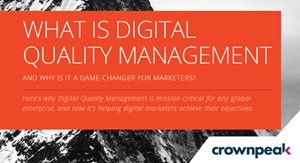Why is Digital Quality Management a Game-Changer?
In late August, here at CMS-Connected, we discussed the expected marketing investment  patterns for 2018, and in that article, I quoted a splendid statement by Shar VanBoskirk, principal analyst at Forrester, saying: “We are seeing a shift away from quantity, toward quality. Within the next five years, we anticipate investment in ad impressions going down. Instead, marketing budgets will go towards brand experiences, CX and in-store experiences and knowledge of sales agents – the things that will help demonstrate brand promise.” Shortly after that discussion, Crownpeak, a cloud-based Digital Experience Management (DXM) platform provider, has released an eBook on Digital Quality Management (DQM) and why it can be an absolute game-changer for marketers.
patterns for 2018, and in that article, I quoted a splendid statement by Shar VanBoskirk, principal analyst at Forrester, saying: “We are seeing a shift away from quantity, toward quality. Within the next five years, we anticipate investment in ad impressions going down. Instead, marketing budgets will go towards brand experiences, CX and in-store experiences and knowledge of sales agents – the things that will help demonstrate brand promise.” Shortly after that discussion, Crownpeak, a cloud-based Digital Experience Management (DXM) platform provider, has released an eBook on Digital Quality Management (DQM) and why it can be an absolute game-changer for marketers.
To go in-depth on this topic, our media reporter Laura Myers, once again, spoke with Adrian Newby, Chief Technology Officer at Crownpeak:
As Adrian pointed out what is standing in the way of effective quality control, the ongoing explosion in the volume of digital content and touchpoints is the primary reason why global enterprises find themselves battling quality control issues more than ever. Whether the error is as simple as a broken link or a misspelling, or as serious as accessibility violations that increase legal and regulatory compliance risks, undermining the user experience may result in financial and reputational losses. That’s where Digital Quality Management (DQM) platforms come into play.
What Does a DQM Platform Do For You?
Enterprises are now contending with the interplay between making information instantly accessible to a range of users, maintaining the high quality while doing so, and keeping it secure against malicious attacks. Fortunately, DQM adoption provides organizations with centralized control of branding compliance, content and messaging across their entire digital presence, based on criteria they set. Here’s how:
-
A DQM platform takes care of brand identity that consists of specific fonts, colors, guidelines for templates and layouts, consistent use of terminology, language clarity, and the detection of prohibited terms and phrases. That way, brands can maintain brand integrity across all their digital touchpoints.
-
A DQM platform ensures that all legally mandated content is present on the organization’s site, including data protection, privacy policies, terms and conditions, intellectual property protection and corporate disclaimers while maintaining brand style and the editorial standards.
-
A DQM platform makes sure that the organization’s website(s) stays compliant with their search engine strategy by effectively and properly using title tags and metadata, optimization of page headings, as well as link text and alt image text.
-
A DQM platform routinely checks for compliance risks and outdated assets. Once detected, it flags concerns for immediate attention and provides enterprise-wide reporting of issues across multiple locations on hundreds of sites, even across geographies, from a central dashboard.
A Content Management System isn’t a Swiss Army Knife
During the interview, Adrian also reminded us of the fundamental premise of CMS platforms: “It is still to help non-technical users build and deliver really exciting and compelling digital experiences,” and added: “You need to realize that a Content Management System (CMS) isn’t a Swiss Army Knife as there are things that it is pretty good at but also there are things that it wasn’t designed to do.”
In the eBook, Crownpeak highlights the three main reasons why a WCM platform isn’t suited for digital quality management:
-
WCM platforms are not designed to automatically keep content in compliance with the company policy and guidelines, WCAG / Section 508 accessibility requirements as well as compliance with its template code, third-party syndicated content, images and dynamic page elements.
-
In the best of cases, a WCM may provide simple automated checks: highlighting misspelled words or grammatically incorrect sentences in specific components. However, a WCM doesn’t test live pages – as they are actually served up to your users - or the back-end code that powers them.
-
Due to today’s unfortunate fact that organizations have highly siloed, multi-platform environments, Crownpeak claims that without a central DQM platform, it’s difficult to create global, enterprise or C-level views of how all these touchpoints perform in terms of enforcing brand standards, customer experience, company policies and legal compliance
Even though CMS platforms are considered the gravitational center of digital ecosystems and experiences, I definitely agree that your content management system can only do so much. This prevailing notion of governing digital content quality through WCM becomes even more obsolete for large-scale organizations as they tend to utilize several CMSs across their organizations. Adrian wonderfully explained why: “Building a quality program in each of those individually is not only expensive but it is really difficult to see how they could keep all of those implementations consistent and up to date with each other. Though there are so many good arguments that back up why using content management system platforms could be helpful to a marketer, using them as a vehicle to manage the content quality is probably not one of them.”
I really liked the analogy that he used to put the importance of quality into context as he said that if it was the airplane construction industry, no one would argue the importance of quality. Just like those industries, scalability and quality of automated activities are accelerating in the content management space as well, thanks to the ever-evolving artificial intelligence technologies such as machine learning. In fact, with contrast to the prevailing conception about automation, the majority of the benefits may come not from reducing labor costs, but from raising productivity through fewer errors, higher and faster output, and increased quality and safety.
Speaking of safety, Crownpeak warns that without policing quality and compliance blind spots across dynamically assembled content and multiple digital touchpoints, there’s danger of not only compromising brand image but exposing an organization to risk by allowing serious breaches in regulatory compliance. I couldn’t agree more. In fact, this argument reminded me of high-profile cyber-criminal cases such as the Panama Papers breach which is the largest data leak in history, the latest Home Box Office Inc. (HBO) hack and the leaked episodes of Game of Thrones, the Netflix hack, and much more. With cybercriminals becoming more sophisticated and organized, it seems to be inevitable not to face with some data security issues for those who are not protected.
As a provider of the only cloud-first DXM platform to feature built-in Digital Quality Management (DQM), Crownpeak has been doing a lot of work in terms of data quality management. Even though initially, the digital quality management capabilities were added to the platform through the acquisition of ActiveStandards, now DQM became one of the core services that comes with the product because the vendor sees policy compliance as crucial. As part of that strategy, Crownpeak acquired Evidon that provides enterprises with patented, SaaS-based solutions for consent, monitoring, and compliance covering the digital ecosystem. The acquisition was very timely as it came shortly after Evidon launched its Universal Consent Platform which the company bills as the first unified solution to help organizations achieve compliance with both the European Union’s General Data Protection Regulation (GDPR) and evolving ePrivacy Regulation (ePr or “Cookie Law”).
My POV
Considering the coming deadline for compliance with the EU's General Data Protection Regulation (GDPR) which takes effect in May 2018, there has lately been increasing interest in regulation technology companies. Whether the motivation is to comply with privacy laws and programs around the world such as GDPR, PIPEDA, ePrivacy Directive, and AdChoices, or essentially maintaining the brand dignity across all digital touchpoints, DQM platforms are no longer just a nice-to-have type of platform in the organizations’ technology stacks, yet they are becoming imperative for digital businesses across all industries. Besides reduced costs, consistent customer experiences, and minimized legal risks, DQM platforms ensure multi-channel compliance with quality.

Venus Tamturk
Venus is the Media Reporter for CMS-Connected, with one of her tasks to write thorough articles by creating the most up-to-date and engaging content using B2B digital marketing. She enjoys increasing brand equity and conversion through the strategic use of social media channels and integrated media marketing plans.

Laura Myers
A digital business, marketing and social media enthusiast, Laura thrives on asking unique, insightful questions to ignite conversation. At an event or remotely, she enjoys any opportunity to connect with like-minded people in the industry.